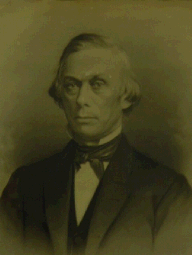William Cannon
William Cannon (born March 15, 1809 in Bridgeville , Delaware ; † March 1, 1865 ibid) was an American politician and governor of the state of Delaware from 1863 to 1865 .
Early years
After finishing school, William Cannon took part in his father's trading business, which he expanded to include the timber and grain trade. He also ran a sawmill and a brick factory. He later also got involved in the newspaper business and banking. Eventually he also became director of a railway company. By 1864 he was probably the richest citizen in Sussex County .
Political rise
Cannon became a member of the Democratic Party . Between 1844 and 1848 he was a member of the House of Representatives from Delaware . Then he became Minister of Finance ( Treasurer ) of his state. He held this office from 1849 to 1851. In 1861 he was a member of an unsuccessful Washington, DC Congress that was supposed to prevent the Civil War at the very last minute . After three unsuccessful attempts to win his party's nomination for gubernatorial election, he converted to the Republican Party in the early 1860s . During the war this party called itself the Union Party and was also open to non-members.
In 1862 he was then nominated by this party for the gubernatorial elections and also elected as the new governor. The elections were overshadowed by the intervention of Union troops who had called in the Republicans to oversee the elections. Over the next 30 years, this led to a rejection of the Republican Party by large parts of the white population of Delaware, which was represented by the then very conservative Democrats; the Republicans at the time were considered the more progressive and liberal of the two parties.
Delaware Governor
William Cannon took up his new office on January 20, 1863. At this point the civil war was still in full swing. The governor had a difficult time in his state. A democratic majority in the legislature accused him of changing party and accusing him of electoral fraud with the help of army bayonets. The reluctance went so far that the House of Representatives refused to make its premises available for the governor's inauguration. Because of this situation, the governor could not move much politically. From 1863 he had recruiting offices set up for African Americans , who thus had the opportunity to join the army. This step was preceded by the abolition of slavery within the US Army .
Governor William Cannon died on March 1, 1865 as the eighth governor of Delaware in office - allegedly after falling ill after putting out a fire. He was succeeded by the then President of the State Senate , Gove Saulsbury . William Cannon had six children with his wife Margaret. The son Philip was the first lieutenant governor of Delaware between 1901 and 1905 .
Web links
- William Cannon in the National Governors Association (English)
- The governors of Delaware (English)
- William Cannon in the database of Find a Grave (English)
| personal data | |
|---|---|
| SURNAME | Cannon, William |
| BRIEF DESCRIPTION | American politician |
| DATE OF BIRTH | March 15, 1809 |
| PLACE OF BIRTH | Bridgeville , Delaware |
| DATE OF DEATH | March 1, 1865 |
| Place of death | Bridgeville , Delaware |

